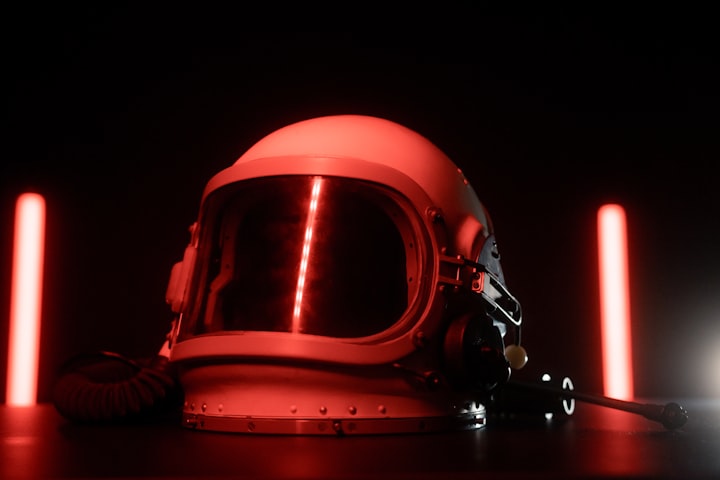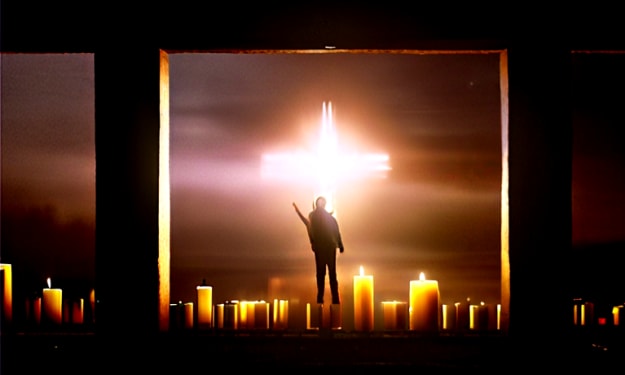Fresh Air
Every year a ship from Earth arrives with a room full of real, honest-to-goodness Earth air for helmetless breathing. This year, no one will take it.

Through the glass of his helmet, they could see the startled flash of the captain's eyes. "You don't?" his voice crackled.
The mayor shook his head from side to side. "Nobody does."
The captain was silent and still for a very long moment. Finally he asked again, "Nobody wants even a minute?" He turned towards the group of workers, hands hanging by his sides. "None of you?"
The workers crossed their arms. Some turned away. A few shook their heads.
The captain turned back towards the mayor. "None of the families, the children, not even any of the old people?"
The mayor crossed his own arms. "You may ask them yourself."
"Please," the captain said. "I have to hear it from all of them--each of them--before I bring the air back home."
The mayor nodded, and then gestured for the captain to follow him. The captain did so, his steps small and awkward in the unfamiliar gravity, wearing the skin of his suit with an ill-disguised discomfort.
It wasn't the first time that people had turned down the environment room. More and more had been waiving their annual right to spend time breathing in Earth's air--stale from the long trip, some said, nauseatingly swampy, said others, positively rancid, many agreed--over the past years. But this was the first time they had all agreed together that nobody would enter the ship's environment room to take off their helmets and fill their lungs with the cloying atmosphere from a planet that claimed to be their home, but that not even the oldest among them had any memory of.
Those who had been refusing the environment room in the past coached the others. The captain would explain the use of the environment room and how it operated. He would assure that there was no danger, and that the air from Earth was good and clean, full of life for the lungs and exactly what humans should have, had always had. He would ask why the colonist didn't want to enter the environment room. Here you were supposed to explain that the helmet gave you all the air you could want, already good and clean, that you had exactly what you should have and had always had from your own home. When the captain was convinced that your decision was fully informed, he would no longer press the matter. Your name was recorded as having refused the environment room, and it was over.
Men and women, old and young, the captain interviewed them all. The first day dragged past, and the second, and the third and fourth. The ship sat looming above the now-empty loading decks, its great bulk idling as its captain sat and spoke and listened.
Finally, on the fifth day, the captain had interviewed the last person and was picking his way back to the ship. The mayor walked with him, pride showing in his every step. The people had held a unified front, and now the air would be returned, untouched, from where it came. It was a historic, if mostly symbolic, moment.
At the foot of his ship, the captain turned slightly towards the mayor, his hands hanging weakly by his sides. “You’re sure-” he began, and the Mayor cut him off with a decisive nod.
“Thank you, Captain,” he said, courteous but firm, “We will see you next year.”
The captain hesitated, then made a small nod and stepped into his ship.
Once inside, the captain took off his helmet, and the crew who had gathered to greet him could see he was pale with exhaustion. "Sir?" one of his officers asked hesitantly, "Do you need me to-"
The captain shook his head, peeling off his suit. "I'll send the report myself." He dragged his hands down his face. "I knew it could happen in my lifetime, I was just hoping it wouldn't." He shook his head tiredly. “Initiate launch. I’ll be out after I finish the report.”
Scratching his head, he trudged back to his cabin, the ship surging to life beneath his feet a welcome sensation after the past days. Slumping into his desk chair, he pulled up the screen for his report, seeking refuge in the terse, formulaic language.
Population count: 781. 37 born 19 died since last.
Power reported steady. Food supply reported steady. Water and air reported steady. [attachments: text.powerconsumption092; text.foodproduction092; text.waterreclaimation092; text.airquality092]
Delivery of goods accepted and signed for. [attachment: text.invoice092]
Environment chamber unanimously refused.
624 individuals over the age of five interviewed. Each refused. Understood environment chamber will not be available again for next year. [attachments: audiovisual.074-698]
The captain stopped, looking at the screen. All he had to do was send it, and the message would travel, faster than ships or sound or light ever could, back home to Earth. Back to the clever scientists and the powerful politicians and the hard-working engineers and all of the millions of billions of minds and opinions and fears and prejudices, a message that would be read and understood and discussed and debated and decided upon weeks before the ship entered Earth’s atmosphere.
All he had to do was send it.
Finally he stood and headed towards the cafeteria. Time was an even more abstract concept than usual while in space, but it was good to have a regular cycle for meals. Most of the crew would be about halfway through their evening meal by now.
"I'm just glad I'm not the one who had to deal with those damn greenies," Kala said, referring to the tint of the helmeted faces left behind. "They give me the creeps."
"It's the way they move," one of her crewmates agreed, "Like they're always on stage or something."
"They rely on body language," the captain said from behind them, and both crewmembers started guiltily. He waved a hand to stymy any apologies, and sat down at the table with them, putting his tray of food down. "If you look carefully from the right angle, you can see their faces. The younger ones don't even make facial expressions the way you and I do."
Kala grimaced, and the captain indicated her expression with a fork, raising his eyebrows. "Little things like that. They don't have to."
"A faceless tribe," somebody commented, and the captain sighed, looking down.
"I don't know about tribe."
The others looked at him questioningly as he fiddled with his food.
Finally, Kala asked him what he meant, and he shook his head. "They were a tribe. I mean, they've been their own culture since the third generation, but now..." he shook his head again. "Now they won't breathe our air anymore. I'm sure that soon, they won't be able to. We tried to put it off as long as possible, tried to keep them with a taste for the impurities of home, but it was inevitable." He put down the fork and looked up at his crew, his face stone as he asked, "What do you call a human who can't breathe the same air as the rest of its race?"
"Not human," Kala's crewmate stated glibly.
There was a deathly silence, and the crew began to look at each other as the full impact of the statement sank in.
"Then wouldn't they..." Kala began, then stopped, trying to wrap words around the thought. "If they're not humans anymore," she said slowly, "Then what does Earth owe them?"
The captain didn't say anything, and with a cold twist in her stomach, Kala realized that he didn't look tired.
He looked scared.
About the Creator
Laura Beth Ramsay
While I am currently employed as a picture framer and window treatments saleswoman, my first love is writing, and my second love is science-fiction.






Comments
There are no comments for this story
Be the first to respond and start the conversation.